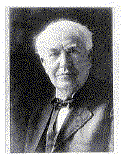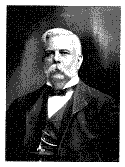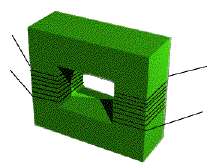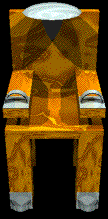


| 
|
 |
| Power Struggles | ||

 One thing physics is good for is deciding who is right, even when large
sums of money, titanic egos, and political influence are all involved.
One thing physics is good for is deciding who is right, even when large
sums of money, titanic egos, and political influence are all involved. A good example is the conflict between the gentleman on the left, Thomas Edison (1847-1931), and the gentleman on the right, George Westinghouse (1846-1914). A little over 100 years ago, these two men squared off in a technological battle that makes and Netscape vs. Microsoft look like little league baseball. I cannot possibly cover all of the twists and turns of this battle, but I will make an effort to give at least a taste of the real action. If you ever get a chance to see it, there is a NOVA program that covers this subject in some detail. It is a biography of Edison titled "The Wizard Who Spat on the Floor (1980). PBS reruns it occasionally, and is well worth watching. The crux of the issue between Edison and Westinghouse was whether AC or DC power would eventually become the dominant technology. At the time, Edison was vastly wealthy, controlled a great deal of industry, and ran a research lab in Menlo Park, New Jersey that was developing more new technologies and generating more patents than any group of people ever had. Edison (and his company) had invented the electric light, electric motors, dynamos and many other products, all of which ran on DC power (the light bulb can run on either, of course). Furthermore, Edison's wealth and that of several large investors was tied up in the manufacture of these devices and in the operation of generating stations that produced DC power. His seven companies, which included Edison Machine Works, the Electric Light Company, and the Sprague Electric Railway, were eventually combined to form the General Electric Company. George Westinghouse was a comparative newcomer to the electric power industry. However, he was a substantial businessman and inventor. He had made a great deal of money on inventions associated with the operation of railroads, and had founded the Westinghouse Air Brake Company, founded in 1869, and the Union Switch and Signal Company, in 1881. In 1886, he and several investors founded Westinghouse Electric in order to compete directly with Edison. The war between AC and DC was on.The fact is, AC is a much better technology. The primary reason being the ability to use transformers (recall chapter 32 section 7). Transformers allow the power company to "step up" the voltage of the power produced at the generator, transmit the power over great distances at high voltage, and then step down the voltage before delivering the power to the customer.Why is this good?  Energy is conserved (almost) in the transformer, so the power in equals
the power out. Power is V times I, so if we step up the voltage by a factor
of one hundred, we step down the current by the same amount. Now, while
transmiting the power, the loss is given by P=I2R (whre R is the resistance of the power line). Thus, if the
current is reduced by 100, the loss is reduced by a factor of 10,000! Don't
forget that in the loss formula P=V2/R V is the voltage across
the resistor (in this case the power line). The line can "float" at very high voltage and
still dissipate little power so long as the voltage across it is small,
and of course, the voltage across it is proportional to the current through
it. In engineering parlance, the power dissipated does not change if the
whole resistive circuit is "floating" at a very high voltage.
Energy is conserved (almost) in the transformer, so the power in equals
the power out. Power is V times I, so if we step up the voltage by a factor
of one hundred, we step down the current by the same amount. Now, while
transmiting the power, the loss is given by P=I2R (whre R is the resistance of the power line). Thus, if the
current is reduced by 100, the loss is reduced by a factor of 10,000! Don't
forget that in the loss formula P=V2/R V is the voltage across
the resistor (in this case the power line). The line can "float" at very high voltage and
still dissipate little power so long as the voltage across it is small,
and of course, the voltage across it is proportional to the current through
it. In engineering parlance, the power dissipated does not change if the
whole resistive circuit is "floating" at a very high voltage.As a practical matter, this means that if your city bought its generators, etc., from Edison, there had to be a generating station every mile or so. New York City had hundreds! On the other hand, Westinghouse could put large generating stations outside town and service many customers. Furthermore, Westinghouse could harness Niagara Falls and other natural sources of power. This would be impossible with DC power. However, Edison would not give up so easily.As I mentioned before, Edison was heavily invested in DC power, and many of his inventions relied on it. However, these facts alone cannot explain his resistance (Ha!) to AC technology. Edison's company had bought the rights to European designs for transformers and other technology, but it seems that Edison mistrusted AC. Some people have argued that he did not understand AC, since it is less intuitive and he was in many ways a "gut level" designer. However, this is by no means certain. various state legislatures to pass laws prohibiting the use of voltages
above certain levels (he recommended 800 V DC or 250 V AC as safe levels).
He wrote a Letter to the Editor published in the New York Post in which
claimed DC was perfectly safe and said "ac can be described by no adjective
less forcible than damnable."
various state legislatures to pass laws prohibiting the use of voltages
above certain levels (he recommended 800 V DC or 250 V AC as safe levels).
He wrote a Letter to the Editor published in the New York Post in which
claimed DC was perfectly safe and said "ac can be described by no adjective
less forcible than damnable."
In a final, desperate attempt to make AC power unpalatable to the public, Edison recommended that NY state adopt electrocution by means of AC power as its method of capital punishment. He recommended AC voltages and times, and suggested the name "Westinghouse Chair" for the instrument. He even recommended the use of the phrase "condemed to be Westinghoused." Unfortunately, when this process was first used (with many dignitaries and reporters in attendance) it was done very badly. Some onlookers thought they saw the body move, so the current was turned on and off several times. The executed man was partiallly burned and his body was too hot to be removed from the chair for a long period of time. This whole ghastly affair was widely reported in the press, and Edison lost a great deal of presitge over it. Ultimately, physics can be counted on to settle this kind of argument. Edison could bully and cajol in the press, and bring a great deal of pressure to bear on legislators. However, the bottom line is that AC is far superior to DC. Postscript: Edison invented most of the DC technology that he defended so strongly. However, Westinghouse did not invent the AC technology. Who did? The man behind the AC technology, and, I might add, behind radio and other technologies was none other than...
|